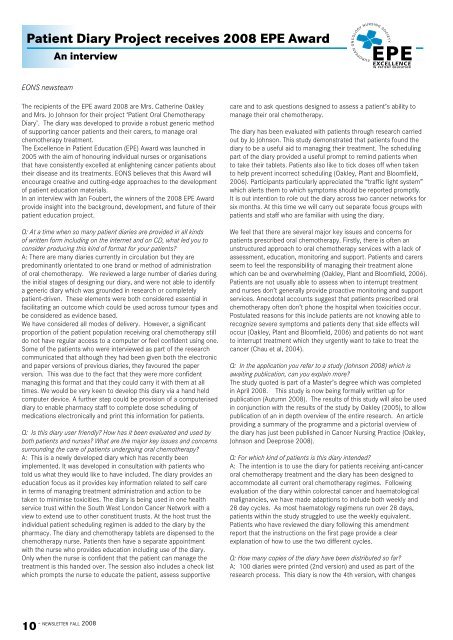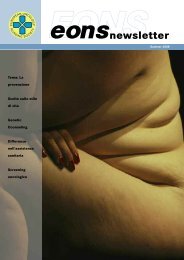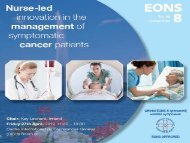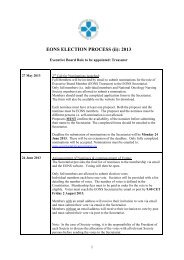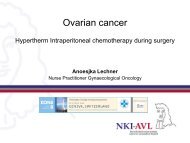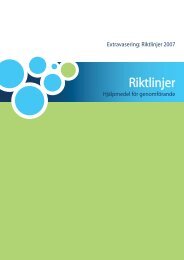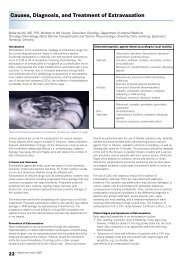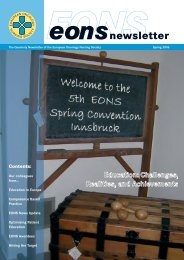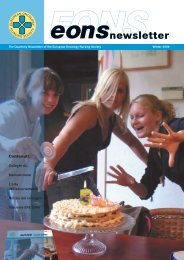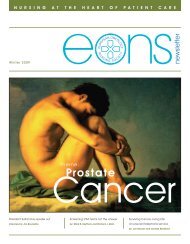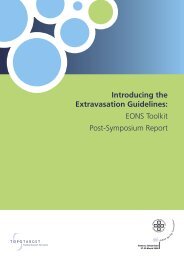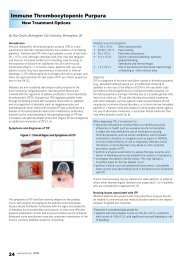English - the European Oncology Nursing Society
English - the European Oncology Nursing Society
English - the European Oncology Nursing Society
- No tags were found...
Create successful ePaper yourself
Turn your PDF publications into a flip-book with our unique Google optimized e-Paper software.
Patient Diary Project receives 2008 EPE AwardAn interviewEONS newsteamThe recipients of <strong>the</strong> EPE award 2008 are Mrs. Ca<strong>the</strong>rine Oakleyand Mrs. Jo Johnson for <strong>the</strong>ir project ‘Patient Oral Chemo<strong>the</strong>rapyDiary’. The diary was developed to provide a robust generic methodof supporting cancer patients and <strong>the</strong>ir carers, to manage oralchemo<strong>the</strong>rapy treatment.The Excellence in Patient Education (EPE) Award was launched in2005 with <strong>the</strong> aim of honouring individual nurses or organisationsthat have consistently excelled at enlightening cancer patients about<strong>the</strong>ir disease and its treatments. EONS believes that this Award willencourage creative and cutting-edge approaches to <strong>the</strong> developmentof patient education materials.In an interview with Jan Foubert, <strong>the</strong> winners of <strong>the</strong> 2008 EPE Awardprovide insight into <strong>the</strong> background, development, and future of <strong>the</strong>irpatient education project.Q: At a time when so many patient diaries are provided in all kindsof written form including on <strong>the</strong> internet and on CD, what led you toconsider producing this kind of format for your patients?A: There are many diaries currently in circulation but <strong>the</strong>y arepredominantly orientated to one brand or method of administrationof oral chemo<strong>the</strong>rapy. We reviewed a large number of diaries during<strong>the</strong> initial stages of designing our diary, and were not able to identifya generic diary which was grounded in research or completelypatient-driven. These elements were both considered essential infacilitating an outcome which could be used across tumour types andbe considered as evidence based.We have considered all modes of delivery. However, a significantproportion of <strong>the</strong> patient population receiving oral chemo<strong>the</strong>rapy stilldo not have regular access to a computer or feel confident using one.Some of <strong>the</strong> patients who were interviewed as part of <strong>the</strong> researchcommunicated that although <strong>the</strong>y had been given both <strong>the</strong> electronicand paper versions of previous diaries, <strong>the</strong>y favoured <strong>the</strong> paperversion. This was due to <strong>the</strong> fact that <strong>the</strong>y were more confidentmanaging this format and that <strong>the</strong>y could carry it with <strong>the</strong>m at alltimes. We would be very keen to develop this diary via a hand heldcomputer device. A fur<strong>the</strong>r step could be provision of a computeriseddiary to enable pharmacy staff to complete dose scheduling ofmedications electronically and print this information for patients.Q: Is this diary user friendly? How has it been evaluated and used byboth patients and nurses? What are <strong>the</strong> major key issues and concernssurrounding <strong>the</strong> care of patients undergoing oral chemo<strong>the</strong>rapy?A: This is a newly developed diary which has recently beenimplemented. It was developed in consultation with patients whotold us what <strong>the</strong>y would like to have included. The diary provides aneducation focus as it provides key information related to self carein terms of managing treatment administration and action to betaken to minimise toxicities. The diary is being used in one healthservice trust within <strong>the</strong> South West London Cancer Network with aview to extend use to o<strong>the</strong>r constituent trusts. At <strong>the</strong> host trust <strong>the</strong>individual patient scheduling regimen is added to <strong>the</strong> diary by <strong>the</strong>pharmacy. The diary and chemo<strong>the</strong>rapy tablets are dispensed to <strong>the</strong>chemo<strong>the</strong>rapy nurse. Patients <strong>the</strong>n have a separate appointmentwith <strong>the</strong> nurse who provides education including use of <strong>the</strong> diary.Only when <strong>the</strong> nurse is confident that <strong>the</strong> patient can manage <strong>the</strong>treatment is this handed over. The session also includes a check listwhich prompts <strong>the</strong> nurse to educate <strong>the</strong> patient, assess supportivecare and to ask questions designed to assess a patient’s ability tomanage <strong>the</strong>ir oral chemo<strong>the</strong>rapy.The diary has been evaluated with patients through research carriedout by Jo Johnson. This study demonstrated that patients found <strong>the</strong>diary to be a useful aid to managing <strong>the</strong>ir treatment. The schedulingpart of <strong>the</strong> diary provided a useful prompt to remind patients whento take <strong>the</strong>ir tablets. Patients also like to tick doses off when takento help prevent incorrect scheduling (Oakley, Plant and Bloomfield,2006). Participants particularly appreciated <strong>the</strong> “traffic light system”which alerts <strong>the</strong>m to which symptoms should be reported promptly.It is out intention to role out <strong>the</strong> diary across two cancer networks forsix months. At this time we will carry out separate focus groups withpatients and staff who are familiar with using <strong>the</strong> diary.We feel that <strong>the</strong>re are several major key issues and concerns forpatients prescribed oral chemo<strong>the</strong>rapy. Firstly, <strong>the</strong>re is often anunstructured approach to oral chemo<strong>the</strong>rapy services with a lack ofassessment, education, monitoring and support. Patients and carersseem to feel <strong>the</strong> responsibility of managing <strong>the</strong>ir treatment alonewhich can be and overwhelming (Oakley, Plant and Bloomfield, 2006).Patients are not usually able to assess when to interrupt treatmentand nurses don’t generally provide proactive monitoring and supportservices. Anecdotal accounts suggest that patients prescribed oralchemo<strong>the</strong>rapy often don’t phone <strong>the</strong> hospital when toxicities occur.Postulated reasons for this include patients are not knowing able torecognize severe symptoms and patients deny that side effects willoccur (Oakley, Plant and Bloomfield, 2006) and patients do not wantto interrupt treatment which <strong>the</strong>y urgently want to take to treat <strong>the</strong>cancer (Chau et al, 2004).Q: In <strong>the</strong> application you refer to a study (Johnson 2008) which isawaiting publication, can you explain more?The study quoted is part of a Master’s degree which was completedin April 2008. This study is now being formally written up forpublication (Autumn 2008). The results of this study will also be usedin conjunction with <strong>the</strong> results of <strong>the</strong> study by Oakley (2005), to allowpublication of an in depth overview of <strong>the</strong> entire research. An articleproviding a summary of <strong>the</strong> programme and a pictorial overview of<strong>the</strong> diary has just been published in Cancer <strong>Nursing</strong> Practice (Oakley,Johnson and Deeprose 2008).Q: For which kind of patients is this diary intended?A: The intention is to use <strong>the</strong> diary for patients receiving anti-canceroral chemo<strong>the</strong>rapy treatment and <strong>the</strong> diary has been designed toaccommodate all current oral chemo<strong>the</strong>rapy regimes. Followingevaluation of <strong>the</strong> diary within colorectal cancer and haematologicalmalignancies, we have made adaptions to include both weekly and28 day cycles. As most haematology regimens run over 28 days,patients within <strong>the</strong> study struggled to use <strong>the</strong> weekly equivalent.Patients who have reviewed <strong>the</strong> diary following this amendmentreport that <strong>the</strong> instructions on <strong>the</strong> first page provide a clearexplanation of how to use <strong>the</strong> two different cycles.Q: How many copies of <strong>the</strong> diary have been distributed so far?A: 100 diaries were printed (2nd version) and used as part of <strong>the</strong>research process. This diary is now <strong>the</strong> 4th version, with changes- newsletter fall 200810


